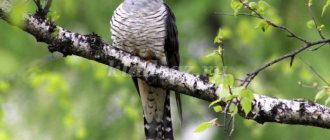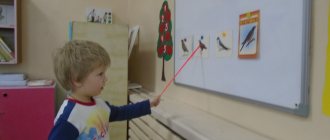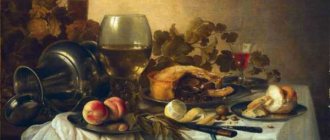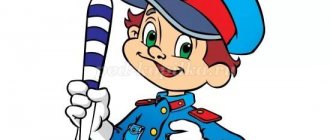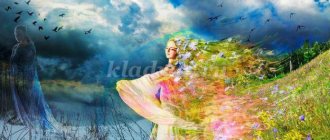Integrated lesson in the middle group “Visiting Autumn”
Summary of an integrated lesson in the middle group “Visiting Autumn.” Author: Prikota A.V.
MDOU Kindergarten No. 127 “Cosmonaut”
Integration of educational areas: “Cognition”, “Communication”, “Artistic creativity”, “Socialization”.
Educational objectives:
- Consolidate children's knowledge about autumn;
- To consolidate ideas about seasonal changes in nature;
- Summarize and systematize children’s knowledge about the gifts of autumn,
- Continue learning to recreate a complete image of objects from pictures cut into 4 parts;
- Develop the ability to group objects according to their characteristics.
Vocabulary work:
- Encourage speechless children to speak up;
- Expand your vocabulary on the topic “Autumn”;
- Activate the words leaf fall, autumn leaves, colorful in children's speech.
Educational tasks:
- Instill the skills of careful work with the materials used;
- To cultivate moral qualities in children (kindness, empathy, desire to help a friend).
- Cultivate friendly relationships, the ability to complete the work started.
Progress of the lesson: (To the accompaniment of calm music, children enter the group and stand around the teacher)
Educator: - Guys, an unusual box appeared in our group. (Children and the teacher examine the box) Educator: - Which box? (beautiful, big, shiny...) Educator: - Gifts are usually put in such boxes! Let's open it and see what's in it? (Open it, take out autumn leaves, each child receives 2 leaves) Educator: - What is this? (leaves) Educator: - What color are the leaves? (red, yellow, brown...) Educator: - What kind of leaves are these? (colorful, autumn...) Educator: - Let's play with autumn leaves.
Game “Which tree is the leaf from?” The teacher names the tree, and the children name the leaf.
An oak leaf has an oak leaf; for maple - maple, etc.
Dynamic pause “Autumn is coming” (repeat 2-3 times) - Autumn is walking along the road (they walk) - My feet got wet in a puddle (they point to their feet with leaves) - It’s raining and there is no light (raise their hands up and wave the leaves) - Lost somewhere - that summer (shrug their shoulders, spread their arms to the sides) - Autumn is walking, autumn is wandering (walking) - The wind has knocked the leaves off the maple tree (smooth movements of the leaves up and down) - There is a new rug under your feet (crouched) - Yellow-pink-purple (jumping ) Educator: - The autumn wind blew, and leaves flew from the trees, leaf fall began. Breathing exercises “Falling Leaves” (repeat 2-3 times) (Children sit down) Educator: - Guys, autumn gave us these leaves. Let's invite her to visit us. Close your eyes and say: “Autumn, autumn! We invite you to visit us!” (Children pronounce the words, close their eyes. The bell rings. The teacher puts on a kokoshnik, throws on a cape - turns into Autumn). Autumn: - Hello, guys! (children say hello) - I heard you calling me, so I came to visit you.
Do you know what the weather is like in autumn? What sky? What clouds? What are the birds doing? How are people dressed? What kind of leaves are on the trees? (Children's answers)
Autumn: Guys, let's collect an autumn bouquet.
Finger gymnastics . One, two, three, four, five, bend the fingers, starting with the thumb, on both hands. We will collect leaves. Rhythmically clench and unclench your fists. We will collect birch leaves, rowan leaves, poplar leaves, aspen leaves, oak leaves, bend your fingers, starting with the thumb on your hands. We'll take an autumn bouquet to mom. Extend your palms forward.
Autumn: So I came to you, but not empty-handed. I brought you gifts - pictures. But the problem is that a strong wind tore them into small pieces. Try to put these pictures together. (Hands out envelopes with cut-out pictures to the children. Children put together pictures with signs of autumn)
Didactic game “Fold the picture” Autumn: - Well done! All the pictures have been collected! Tell me, what time of year is shown in the pictures? (autumn) - Correct. Why do you think so? (children tell what signs of autumn are depicted in their pictures) - I have another game - “Harvesting.” Go out into the forest clearing. (Children leave the tables and approach the board on which images of vegetables, fruits, and berries are placed)
Didactic game “Harvesting” Autumn: - Now help me put the harvest in baskets. (After the game, the children stand in a circle) Autumn: And now we will tell you how to harvest.
Outdoor game "Harvest"
Let's go to the garden (they walk in a circle) Let's collect the harvest. We will drag carrots (“drag”) And we will dig up potatoes (“dig”) We will cut a head of cabbage (“cut”) Round, juicy, very tasty (show the circle with their hands - 3 times We will pick up sorrel a little “tear”) And we will return along the path (walk in a circle, holding hands).
Autumn: - Oh, what do I hear? (The soundtrack “Sounds of Rain” plays) - Listen to it too. What is this? (Children listen and say what these sounds are) Autumn: Let's show how it rains.
Finger exercise “Rain” (Children depict rain with their fingers and at the same time pronounce the words) - Fine rain knocks on the roof, Now louder, now quieter. Drip-drip (loud), Drip-drip (quiet). But it’s not just rain, the rain sings a song: Drip-drip (loud), Drip-drip (quietly).
I Autumn: - Well done, guys! It was great playing with you! Did you like my gifts? (children's answers) - Well, it's time for us to say goodbye. I’ll go into the forest and put things in order: I’ll paint the trees with multi-colored paints, lay out a multi-colored carpet in the clearing, treat the squirrels with mushrooms and berries. Goodbye guys! Close your eyes and listen to the magic bell. (Children say goodbye to autumn, close their eyes, the bell rings, the teacher takes off his suit). Educator: - Who came to visit us? What gifts has autumn brought us? (autumn leaves, vegetables, fruits...)
Lesson summary
Abstract of GCD for children of the middle group on the topic: Autumn
Summary of direct educational activities “Autumn Gives Miracles” for children of the middle group (4 - 5 years old).
Author: Akinina Zhanna Anatolyevna, teacher of MBDOU No. 22 “Smile”, city of Stary Oskol, Belgorod region. Description of the material: this summary is designed for children 4 - 5 years old (middle group). Can be used by educators to work on environmental education and familiarization with the outside world. Develops children's curiosity, observation, and aesthetic perception of natural phenomena. Goal: developing ideas about autumn based on familiarization with the essential features of the season. Objectives: 1. Develop curiosity, creative imagination, coordination of movements with speech, auditory and visual perception, the ability to distinguish leaves of different trees, dexterity. 2. Learn to understand the content of poetic texts, practice the formation of different forms of verbs, improve the grammatical structure of speech (formation of the plural of nouns), enhance the enrichment of vocabulary on the topic of autumn. 3. To cultivate in children emotional responsiveness to nature, interest and a caring attitude towards the plant world. 4. Arouse interest in your own hand, introduce the possibility of creating images based on identical elements. Vocabulary work : autumn, turned yellow, turned red, turned golden, howls, hums, moans, pours, walks, drizzles. Preliminary work: looking at tree leaves while walking, observing the autumn sky, trees, and inanimate natural phenomena. Equipment : plot paintings depicting the seasons, a tape recorder, a cassette recording “Autumn Songs” by P.I. Tchaikovsky, tree leaves made of colored paper, a parcel box, a folding umbrella, subject pictures depicting fruits and vegetables, a ball, a sheet of cardboard size A3, gouache paints, easel, napkins for each child. Friends, today we are going on an extraordinary journey. To a wonderful country, a mysterious country, full of secrets. “But trains don’t go to this country, And planes don’t fly there, What should we call this country? A country that’s just a stone’s throw away!” And here's a simple secret. You can get there only if you say the magic words (the teacher plays a recording of “Autumn Song” by P.I. Tchaikovsky). Close your eyes and repeat after me: “One, two, three! Open the door to our fairy tale!” Open your eyes, it seems we are there (children look at a panel depicting the autumn season, admire the bright colors. The teacher reads a poem about red autumn). “Summer Garden” The Summer Garden has turned a little red. At least repaint it! This autumn - a red cat - snuck into it on a dark night. Where she stepped on soft paws, There she left her mark: The crown of the oak tree - in yellow patches The maple burns with fiery leaves. On the lawn - look for yourself - Not grass, but red wool! This cat was tired of climbing and decided to sit down in the grass. G. Novitskaya Tell me guys, what is this poem about? (about autumn). Who does the poet compare autumn with? (with a red cat). Do you want autumn to come? (Yes). It's sad to say goodbye to summer, but autumn will delight us with its wonders. Autumn, like a skilled artist, has chosen the brightest colors to decorate nature. Children, what color do you think is autumn? (yellow, red, orange). Can we say that autumn is colorful? (Yes). Guess the autumn riddle: “Are gold coins falling from a branch?” (these are leaves). Look at the miracle of this autumn bouquet of leaves (the teacher distributes the leaves to the children). Aspen leaves are red. So what did they do? (blushed). What do aspen leaves look like? (for coins). Maple leaves are yellow. So what did they do? (turned yellow). What do you think maple leaves look like? (on the palm). What tree has lost this feather-like leaf? (Rowan). Golden rowan leaves. So they turned gilded. Let's say this word together (pronounced in chorus). What wind blows in autumn? (cold, piercing, angry). What does the wind do? (howls, hums, moans, roars). And suddenly an autumn breeze blew. The leaves scattered. How many leaves! Yes, we have a whole tree here, like on a kindergarten site. Outdoor game: “Leaves” The autumn leaves are quietly spinning (spinning in place, arms to the sides) The leaves are quietly lying at our feet (crouching) And rustling and rustling under our feet (moving hands right - left) As if they want to spin again (spinning in place, On the socks). Let's collect a beautiful bouquet in a vase. Let it please us with its beauty (children sit on the carpet). The teacher reads a poem. “What happened” Oh, what happened, What happened! The door opened quietly and closed quietly. We judged, we dressed, and gave up thinking: Who threw us a yellow leaf over the threshold - A letter from autumn? O. Driz The teacher shows the box, opens it and reports that our group has received a package from the fall. Guys, do you know the signs of autumn? (Yes). Let's play the game "Autumn Signs". When I name the signs of autumn, say “yes” in unison. If the signs refer to a different time of year, say “no” together. You are ready? (Yes). Give the correct answer: Do flowers bloom in autumn? (No). Do mushrooms grow in autumn? (Yes). Are the clouds covering the sun? (Yes). Does it rain often? (Yes). Are the fogs floating in autumn? (Yes). Well, do birds build nests? (No). Do animals close their holes? (Yes). Is everyone getting the harvest? (Yes). Are flocks of birds flying away? (Yes). Is the sun shining very hot? (No). Does everyone swim in the river? (No). Can children sunbathe? (No). Well, what should you do? Should we wear jackets and hats? (Yes). Should everyone wear boots? (Yes). Well done! You know the signs of autumn. I’ll tell you a riddle, listen carefully. Riddle: “A blot appeared in the sky. If the blot roars, all the people will run away” (cloud). It often rains in autumn. What does rain do? (drizzles, walks, makes noise, pours). Look, it’s become cloudy, it looks like it’s starting to rain (the teacher opens his umbrella). Outdoor game: “Rain” Drop one, (jump on tiptoes, hands on belt) Drop two, (jump on tiptoes, hands on belt) Very slowly at first (four jumps on tiptoes, hands on belt) And then, then, then ( eight jumps on tiptoes, hands on the belt) All run, run, run. We opened our umbrellas (spread our arms to the sides) and protected ourselves from the rain. (close your hands above your head in a semicircle). The rains have passed. The sun came out. Sit down in the forest clearing (carpet). “Today, friend, don’t yawn, reap the harvest.” Didactic game "One - many." Let's play ball. I throw the ball and name one vegetable or fruit, and you catch the ball, throw it to me and name many vegetables or fruits (cucumber - cucumbers, tomato - tomatoes, apple - apples). Drawing “Colored palms” (autumn leaves). Today we will draw leaves, but we will not draw with paints and pencils. Guys, you know, you can draw with your hands. There is an expression “our hands are not for boredom.” Today we will paint our palms with multi-colored gouache paints and put prints on sheets of paper. The teacher dips his palms into plates with diluted gouache paint, puts his palm with fingers apart to a sheet of paper placed on the easel. What does my palm look like? (on maple leaves). The teacher invites the children to transfer their “hands” to a large sheet of white paper. This is the kind of leaf fall we have, yellow, red, green leaves are flying. Well done! References: 1. Gor’kova L.G., Kochergina A.V., Obukhova L.A. Scenarios for classes on environmental education for preschoolers (middle, high, preparatory groups). - M.: VAKO, 2005. - 240 p. — (Preschoolers: we teach, develop, educate). 2. Lykova I.A. Visual activities in kindergarten: planning, lesson notes, methodological recommendations. Senior group. - M.: "KARAPUZ - DIDACTICS", 2008. - 208 p., 16 sheets. incl., reissue revised. And. add. 3. Nishcheva N.V. Notes of subgroup speech therapy classes in the middle group of kindergarten for children with special needs development. - St. Petersburg: DETSTVO-PRESS, 2008. - 656 p.
We recommend watching:
Summary of GCD in the senior group on the topic: “Magic umbrellas!” Video on environmental education in the elementary level. Notes on problem-based learning in the senior group. Feed the birds in winter Ecological fairy tale for children 5-7 years old
Similar articles:
Quizzes for high school students. Topic: Ecology
Extracurricular activity for 10th and 11th grades. Topic: Ecology
Proverbs about autumn
Calendar. Day after day
Poems about autumn for children
